
States of Poetry ACT - Series Two
Series Two of the ACT States of Poetry anthology is edited by Jen Webb and features poetry from Merlinda Bobis, John Foulcher, Kerry Reed Gilbert, Geoff Page, Melinda Smith, and Isi Unikowski. Read Jen Webb's introduction to the anthology here.
The Undiscovered Country
tears itself from its own body
Minos condemns it to the seventh abyss.
wherever Fortune casts it, and there
it germinates, like a dropped grain of spelt.
...
The leaves here are not green, but some colour
drained of light; the branches not lithe, but gnarled,
knotted to each other, bearing no fruit but poison thorns.
From Dante, Inferno, Canto XIII
Waking here, it seems I have taken root
in a stand of coastal trees, of a kind I have seen sometimes
by tidal rivers, where the air smells bad.
Each of us has tiny needles for leaves
our bark is almost black
the wind scrapes us against each other, and we moan.
Our ground is grey sand, pitted
with an impossible number of ant-holes.
We block so much light nothing else grows but ivy,
escaped from some place it would be more welcome.
Mosquitoes rise from the river in the evening
to sing in our ears like tinnitus
(our ears which we have lost) -
somehow it has been arranged that we can still hear
that which is unpleasant -
and the harpies are real, yes,
but they remind me of choughs,
red-eyed, wheezing pack-birds
they perch, tear at our leaves,
feed bits of us to their chicks.
We feel their claws and beaks as if we still had skin.
I never once loved my body.
At first I hardly noticed it
then later - when it bled every month
when my breasts swelled, intruded themselves,
complicated my every move - it felt more
like a punishment, a humiliating
costume into which I had been sewn.
Too big, too floppy, too pale, too slow.
Sometimes I tried to take control
to starve it, cut it, knock it out with drink.
Later I simply bore it as a burden
as one does. I can barely believe
I had the gall to get out,
to rip the seams and shed it to the floor.
I will be a long time growing in this grey sand, a long time
missing every fleshy inch, every organ,
regretting my frenzied exit.
No coming back from that.
On the last day, we will be sent
to find our bodies again. We are to drag them
back here, through the ants and the ivy,
to hoist them on these black branches.
Others are permitted to wear theirs once more -
coats fetched from a cloak-room -
but we have forfeited that right. Mine will be dangling
just there, turning slowly in the bad air
from the river. Every so often I will meet her eye
(with my eyes, which I have lost). Somehow
it has been arranged that I will always see
that which is unpleasant.
Melinda Smith
Canto XIII of Dante’s Inferno describes the second ring of the seventh circle of hell, where suicides are condemned to grow without their human bodies, as stunted thorn trees. The epigraph to 'The Undiscovered Country' is my (re-ordered) translation of the following stanzas:
non rami schietti, ma nodosi e ‘nvolti;
non pomi véran, ma stecchi con tòsco.
...
Quando si parte l’anima feroce
Dal corpo ond’ ella stessa s’è disvelta,
Minòs la manda a la settima foce.
ma là dove fortuna la balestra,
quivi germoglia come gran di spelta.
I also consulted the translation by Robert and Jean Hollander (Anchor Books, 2000).
No name or rank supplied
We’re looking down the barrel of
a.303 Lee Enfield,
standard issue through until
the early 1960s.
The others in the firing squad
have all been cropped away, it seems.
He is an officer, we think –
that small, smart cap betrays him.
His hair’s well-trimmed and business-like;
he seems somehow unduly clean
to be an executioner.
The scene, most likely, is in England,
following some short appeal.
We hear the heel-click somewhere.
Fifteen foreshortened yards
are whitely stretched between them,
this man who wields the rifle and|
the man who will be killed,
hands behind his back
and tied there to a pole,
a white patch on his heart,
the blindfold also white.
The photograph is all perspective;
it offers nothing else.
We shape a story for ourselves:
the crumpled wretch, a miner
collected in Lord Derby’s Scheme,
that final German barrage
proving one too much,
the officer, an ‘Eton man’
but maybe that’s that’s not right.
The victim could be stooped with Classics,
‘unsuited to the field’,
the shooter, an ambitious clerk
who’s clambered through the ranks to be
one of all those subalterns
flattened in the first few weeks.
The caption says just: ‘British soldier’.
No name or rank supplied.
Geoff Page
I agree with T.S. Eliot that the poet should never ‘explain’ his or her poem but it may be relevant to note that WWI is an issue I’ve never quite been able to escape. The current centenary has, of course, revived interest. The injustices of the war are innumerable but the execution of ‘failed’ combatants by their own side is one of the more notorious. As far as I know, Australia was the only participant never to do this. ‘No name or rank supplied’ is a meditation on an interestingly ambiguous photograph – Geoff Page
Patriotism
‘... the last refuge of a scoundrel’.
Samuel Johnson
But here and there a whisk of it
does no essential harm:
an accidental win or two
in sports you never follow,
a minor decency observed
by those you didn’t vote for,
a set of figures showing that
we’re still not quite the worst
of countries with a moral fault
but clearly in the running.
The high point comes though when
a boy or girl who seems to hail
from Beijing or Bangkok
or even Addis Ababa
starts addressing you in diphthongs
first heard long ago
among your parents and their friends
who’d seen off a depression
and managed World War II,
that accent which is ours alone,
mysteriously quite unlike
all other Anglophones,
its vowels worn down by space and weather,
eucalypts and stones.
Geoff Page
My ‘Patriotism’ poem is as close as I get to a dangerous emotion. I find I can’t help liking the way the children and grandchildren of migrants and refugees take on (unconsciously, I think) a lot of the accent I grew up with in the 1940s (and in which I still proudly speak – though sometimes with an ironic smile as well.) – Geoff Page
Flags
January 26
The honours list has been announced,
recipients are ‘humbled’.
Three jet fighters, adolescent,
fly past proving nothing.
Fireworks later on are promised.
None of this requires
my serious attention.
How many million barbecues?
Our tall ships and our
sixty thousand years
attempt a sort of balance
along with sundry new arrivals
delivered without fuss
by fishing boat or plane
and living out their thanks ...
with just a few offshore
serving an eternal penance
and some down here more miserable
than we imagine they should be.
What other birthplace would I want?
Half a dozen (max) world-wide
would be no less congenial.
And so it is today,
the twenty-sixth, with beer in hand
and no particular excitement,
I am a patriot-in-waiting
waving lines like these.
Geoff Page
‘Flags’ is another patriotism poem but from a slightly different angle. It’s an undeserved bonus to be born in a country about which one can be lazily ambivalent. It’s not a luxury afforded everyone. – Geoff Page.
Judgement
If all we’re told is right
how wearisome He’ll find it;
all those fine gradations,
those mitigating factors.
Psychopaths are easy
but who are we to say?
The virtuous are harder,
their sin of subtle pride,
their svelte self-satisfaction.
The normal are the worst,
one day a fine donation,
next day a little nip,
a joke that cuts too deep,
some small misuse of power.
And then, just one day on,
an act almost heroic,
a plunge with coat and tie
and no great poolside skills
to save a splashing baby.
There could be sub-committees
but it’s no six-day labour.
So long the pressure’s built.
Was this a good idea?
And, yes, temptation too –
the ‘Dammit, you can all
go hand-in-hand to hell’
or ‘Form your two-by-twos;
step neatly through the gate.’
But how is it with me?
you find you’re thinking now
at ‘three score years and ten’
Those minor decencies?
That half-arsed paltriness?
The times you walked by on your own
and when you stopped to help?
Your case is so mundane and yet
impossibly unique.
You’ll look at Him and say,
‘You should have always known.’
Geoff Page
‘Judgement’ reflects not only my sicty-year-old agnosticism about God and his works but also a strange admiration for real-life sentencing judges who manage to balance so many contradictory pressures to come up with an appropriate punishment. Of course, egregious errors are made. Probably by God too. – Geoff Page
The Notebooks
Thirty years of dreams are stored
in notebooks, written down on waking.
Her daughter’s kept them all,
imagining her mother moves
among those shimmering and scribbled
layers on a bedside table.
Those narratives live on, she’s sure,
in all their raw hallucinations,
their sudden runs of ecstasy,
their weird humiliations.
Yet from her own the daughter knows
how quickly dreams disperse
albeit still a minor guide
to all that daylight tries to hide.
Geoff Page
‘The Notebooks’ derives from a conversation with a friend whose mother was one of Australia’s great writers. While almost everything was handed to the NLA, my friend (who’d prefer to remain anonymous) kept her mother’s dream notebooks. I haven’t spoken to her since about what use she’s made of them but it was an interesting decision. To most writers, dreams supply remarkable raw material, not always in ways that can be easily traced. – Geoff Page
Grammar Lesson
There should be a name for the special case
in which we say ‘the crowd marvelled’,
if the roar that rose
over the back of the stadium walls
over the rain-shingled streets
conveys the sense that what mattered
on the pitch, or the court, happened
in the eyes that watched it;
that indicates a place has changed
for our having stood there
– in front of the little parish school, say –
sheltering from drizzle and the headlights’ dazzle
under a descant of leaves
the better to watch a harvest moon;
that means the world is trying to tell you something:
not to the undergraduates howling at Halloween,
not to the dog-walkers who look up as they pass, and nod
but to us, as we stand there to marvel
at that red corsage pinned to a foreign sky
above staircases twined
like DNA toward kitchen lights
shining through the transom windows.
Isi Unikowski
The ‘staircases’ in the final stanza might be recognisable as a distinctive aspect of the architecture of Montreal, which my wife Lidia and I visited in late 2015. Beyond that, however, the poem picks up a favourite theme, the nature of perception and its mediation by language and by our significant Others.
The Jugglers
In the warm dusk, pink and purple arcs
appear above the old town’s lanes
as jugglers toss their clubs outside
a gallery’s bright, acrylic interior.
Petunias lean from baskets like cheerful spectators
carriage horses wait in plumed rows
for tourists from the ship that dominates the wharfs
below. A couple and their son pause
with the laughing crowd.
He allows himself to be photographed
against a fresco along with trappers, traders and explorers.
– How thin he seems beside those ramparts.
His parents, under strict instructions not to look back
to see if he is following
look back
but he has turned away
he has become hard to find in the shadows
at the audience’s edge.
Lights flicker and shift on his face
as he seems to stare at a juggler’s jeweled midriff.
But he too is conjuring
glass constellations that glitter in his mind
an arc of possibilities across the warm night sky.
What are they worth, those dreams,
if they don’t burn like acid
if they are not as heavy as uranium
if they don’t scatter like quicksilver, only to return
when the rain, like a child,
brings its neighbourhood to your door?
Isi Unikowski
Another recollection in tranquility, this time based on Quebec City. The technical interest in this poem, for me, was about how physical contrasts – light and dark, thin and heavy – might serve as an objective correlative for the familial drama taking place.
‘You Never Said It’s A Race, Dad!’
Oh, but it’s a race all right, trust me, kid, that
hill he almost managed to beat you to the
top of (‘Rubbish!’) challenged him more than you, de-
spite all the picnic
stuff he made you carry in your Batman rucksack.
It’s a race to find all the spare parts, becoming
antiques, puzzling kids in the bike shop while you’ve
multiplied years like
gear ratios; slipping cables, missing
chain links, pedals going around faster but the
landscape’s keeping pace with his hunched shadow
even though you’re nudging his
rear wheel; love ballasts his panniers.
You imagine the peloton behind you, scattered by your
wake; while his has vanished round the next un-
fathomable bend.
Isi Unikowski
This response to a kid’s excited banter with his dad, overheard while strolling around the lesser-known shores of Lake Burley Griffin to the west of the ANU, came (almost) ready-made, including its Sapphics. – Isi Unkowski
Still Life
As if all the world’s ravel, its bright course
of device were to stream through a pinhole in the side
of a box and emerge into a corridor of Delft tiles
on which tiny figures from childhood or a dream semaphore
at my self-portrait, ghostly pentimento in its dun
vestments, and the servant drying linen in the dunes;
the images unclear, inverted. Details
such as these meant something to us once, we’d
have recognised the tulips, citrus, overturned bouquet,
understood why a chalice struts on damask drapes.
Now language falters; out of my time I gape
at the mantel, a strand of dropped
cargo, the tendered quay
at which ships ready their serene freight;
ponder an hourglass, insects, the gap
that sets beyond reach the risqué
hare proffered to an abandoned lute
pewter languor of a herring on its plate
crimson fruit chased in lattice light.
Isi Unikowski
Traditional still life painting raises all sorts of questions about contemporary popular culture as a distinct space, with its own laws, language, and cultures that interact with, but are distinct from its social and economic foundations. I’m interested in how the signifiers and visual metaphors worked in traditional still life painting, in a way that was commonly understood and integrated with wider cultural settings. Do those mechanisms still apply today, or has ‘meaning’ become impoverished, capable only of being widely communicated in a debased and alienating form?
In Place of a Bio
Can we not take all these prizes as given?
The awards, fellowships and accolades
that greeted an awaited first book, the driven
milestones of a talent in spades?
Must everyone describe the same lookouts
from Parnassus’ slopes, Calliope’s redoubts?
When all are gods, let the lame smith stand forth:
just for once, couldn’t the editor decree
that in, let’s say, 200 words (because less is more)
we will hear, not these extracts from the Laureate’s CV
like weather reports on the evening news
telling us everything we already knew,
but—how it felt to be married to one
never entirely there; who applied
stratagems of retreat so everything done
was done as though behind glass, or on a slide—
that call, or letter, that caused a leap of joy or a grudge,
demography’s prolonged, sullen trudge;
how the widow, whom posterity will vilify
sorts through the journals and notes left there
to converse, finally, with the man who shut himself away
from her, every night, while she waited upstairs.
Let’s read, in that para underneath the last stanza
how every quarrel, mined, gave up its bonanza,
let’s hear, in these notes at the end of the book,
how to probe the auguries of his demeanour,
how you became a Vendler, a Bloom, of that look
that said: ‘I’ll break your things, then write a sestina.’
No, I swear, next time they say ‘please provide a brief summary’,
I’ll get the other half to send them some flummery.
Isi Unikowski
The Poetry Exam
The hall begins to fill. The students sit.
She sets her papers neatly on the desk
and rolls the lines around her mouth, flits
from word to word, moves her lips. The rest
is left to memory. The tests are stacked
for passing out on perfect, icy lines
of tables set in single file, tables packed
away when half-right answers whine
and plead for one mark more. She’s worked
for this. She knows the poems like friends,
she’s been to bed with them, she’s heard
their true confessions, knows their ends.
The earth moves. She turns the paper, reads it all.
She tears it into tiny bits. She leaves the hall.
John Foulcher
Paris Evening
13 November 2015
It is Friday, around five. He is
strolling on the rue Voltaire, flâneur
for the young century. The afternoon is crumbling,
the trees are shutting down for winter,
leaves pirouetting to the street
and cracking like small bones beneath his feet.
All around him, the streetlights are coming on,
canisters of empire, recalling days
when endings were clamorous.
He stops at a pharmacy, lingers
beneath its green neon cross
and picks up something for the season’s first flu.
Outside, the boulevardes are burning
with bars and cafés, boulangeries
lined with bright, sticky sweets like porcelain toys.
He brushes the shoulder of a blonde woman
in black, says Desolé, passes a tabac
and buys some cigarettes, thinks how quickly
the last packet went. He meets his lover
at the Café Bonne Bierre. It is still
warm enough to sit street-side and smoke.
They rattle around in their half-empty glasses.
Her eyes smoulder, a promise. They touch,
incidentally, finish their drinks
and leave to see the American band.
The hours are tumbling, but they have
plenty of time. They will hear the first, jangling notes.
John Foulcher
Mark, Pauline and Me
1970
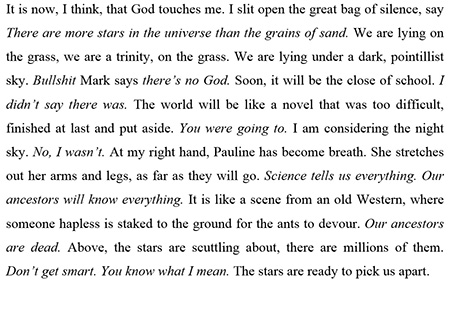
John Foulcher
Holly and Will
1972
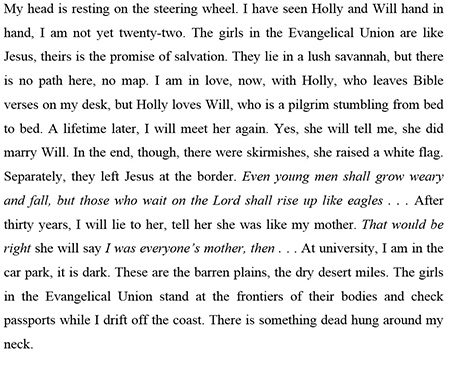
John Foulcher
Before the Storm
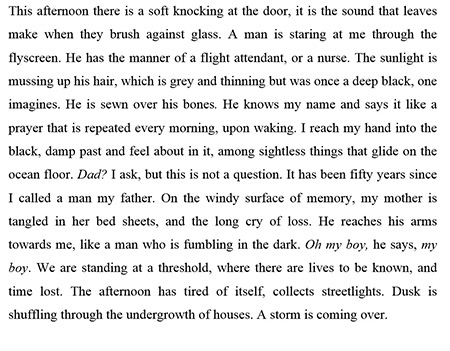
John Foulcher
Just leave your mark here
I won’t do you no wrong
I’m a man that you can trust
I’m not like the others
I’m a honourable man
Some people say
there’s no honour among thieves
but let me tell you straight
We, guberment men,
sent by the King we steal their land
by one stroke of the mighty pen.
But don’t tell anybody that.
Not our fault if some settlers kill the native born
with a shotgun placed between their eyes.
Shoot their families dead.
We wipe our hands of the mess we do
and look the other way.
Blinkers we only see what we want
and what we see is a pound or two in the coffers
so leave you mark here cause
when you do I’m gonna be a rich man.
Just leave your mark here because tomorrow
you’ll be dead and dead men got no use for land.
Kerry Reed-Gilbert
Red Earth
dirt
sunset
sunrise
sunburnt
Old fella
Blackfella
Culture
Creation
Biamie
Dreaming
Belonging
Me.
Kerry Reed-Gilbert
Wiradjuri country
1,000ks Wiradjuri country
Eagles, angels, sun bursts,
gum trees, geraniums
and a pocket full of poetry.
I travel my country,
my land,
my life,
my religion.
The bush calls me back
to the time of before.
Before tar and cement.
Brick walls and tin roofs.
To the time of Creation
where men were men
and honesty was Lore.
Wiradjuri country,
Spirit of the earth.
Red dirt, dignity.
Truth and justice.
Lores of the land.
The wind whispers
as it captures me
reaching deep into my soul
thousands of years
of memories enter my spirit
as they guide me through country.
Dignity and pride as I stand proud
before my Elders of long time past
I honour them with dignity and courage
as I walk upon my land.
I am Wiradjuri.
Kerry Reed-Gilbert
Got ya
I knew he was mine
frothing at the mouth
(literally speaking)
I was waiting for him
my body ready to strike
Like a leopard
on the verge of attack
I waited, biding my time.
I held my breath.
My muscles taut
prepared to pounce
to strike, to maim.
I knew the moment was at hand
the spirits played around him
I watched him fight for courage
to utter the words for me
to slash at his heart
my claws willing to impale him
with a death blow.
Abos – why say sorry to the Abos
we had to teach them to use the knife and fork
they would have been lost without us
Abos – why say sorry to the Abos
I got him, he never knew what hit him,
he will never utter those words again.
Kerry Reed -Gilbert
The old rugged cross
When the spirit has been broken
and there’s no place to go
When you look around the world
wondering what went wrong
When your heart is shattered and
torn no patch ever big enough to help it mend.
No bandaid to help it heal.
When tears roll down your face
cascading like a roaring river
When the spirit has been broken
and there’s no place to go
you wonder what went wrong
to make your life too much to bear
They say a person is only given
in one lifetime what they can endure
That the will to live and the spirit will get stronger
The old rugged cross sits high on my shoulders
I feel my hands nailed blood oozing
I feel tarred and feathered
Tattered and torn
When the spirit has been broken
and there’s no place to go.
I want the world to stop and let me off.
Kerry Reed-Gilbert
submergence
I was all angle once
sharp and schist-like
a spiked rock dragon-back
arching into air
too late you learn the long
wash of days given grist enough
finds your fissures
chafes them wide
these days knowing I wade
in a rising tide of blonde of bland
when my time comes
I will degrade with particulate grace
become the merest dimple
in a cheek of beach
smooth and silted
with my own crushed dust
Melinda Smith
What you get when you search for silence
(poem composed of Hansard search results from November 1962)
one of his colleagues has gone into a significant silence
to silence us, but this is having no effect
listen in silence
spoken and heard in silence
the Prime Minister has observed an unusual silence on this matter. There was an old Australian play, written many years ago, called “The Silence of Dean Maitland”
The honourable member talked about the silence of Dean Maitland. The silence of Arthur Calwell is the more remarkable aspect of this matter
I received a certain amount of ridicule, and a certain amount of scorn by silence
there is a period of awful silence while research is carried out, and the soldier continues
out of the silence into which he has preferred to enter
I am also conscious of the silence,
that there was silence. That is the answer about the £10,000.
Melinda Smith
Hammam
(translated from a Persian ghazal by Rabi’a Balkhi)
I am back, locked up in this love again,
all my daring escapes end here.
Love is a broad shoreless sea
tell me, o wise ones, who swims it and lives?
To take love all the way
you must embrace every horror;
adore ugliness like a fair face;
make sweet delight of poison.
I bucked like an unbroken mare; I did not know:
the harder you pull, the tighter the rope.
Melinda Smith
Semi-legendary Persian poet Rabi’a Balkhi رابعه بلخی is reputed to have lived at the same time as the poet Rudaki, in the early-to-mid 900s, in Balkh (in what is now northern Afghanistan, at the time part of the Samanid Persian empire). She is supposedly the first female poet to write in the Persian language. Her tragic story is well known in the Khorasan provinces of today's Iran and Afghanistan: her tomb is still a site of pilgrimage, and Afghanistan’s first ever feature film (Rabi’a Balkhi, released in 1965) was about her. She was murdered by her brother, a provincial governor, for falling in love with one of his slaves. Her brother had her throat cut and imprisoned her in a bath-house to bleed to death. Hammam (‘bath-house’) is my title for an untitled ghazal by her. This is her most anthologised poem: according to the legend it was written in her own blood on the tiles of the bath-house as she lay dying. With many thanks to Omid Behbahani and her husband Mr Tahami for their generous assistance with the translation, and to Dr Hashem and Mina Etminan for putting me in touch with them. I have also referred to other translations by Inamul Haq Kausar, Manouchehr Saadat Noury, and Vesta Sarkhosh Curtis with Sheila R. Canby.
some trees
spotted gum
tall classy lady
cradling a listing turpentine
(shaggy old top-heavy
barrel-chested nuisance)
she props him
takes the strain
holds her own line almost true
that’s what you get
when you get
married in a windstorm
but the wind always changes
strands you in strange attitudes
let him slide girl
next big storm
he’ll take you both down
and if the weather holds
those bastards can live
five hundred years
drop him
like a rotten branch
Melinda Smith
After the Grand Canyon
18 October 2014
It’s an accident
of composition: sun, sky, bird.
White orb on storm grey
punctuated by a raven –
but which composes which,
and which is accidental?
Is it the sun
a hole
sucking in a bird,
or Icarus about
to singe the sun?
Against the grey
both soft and sinister,
anything is possible.
Look: barely a thumbspan
between
sun and bird
before the answer is given.
Enough to fit
the fingerprint of god.
Merlinda Bobis
The colour of eyes
For Banduk Marika, Aboriginal artist
1. After your story of the funeral, August 1991
Black, Banduk, is the colour of eyes
like night shrunk
when grandma tidies after grief.
Perhaps she could not spill
to stain the room.
Black, Banduk,
this quaver fisted
in her throat –
it has no moon,
it aches with too much swallowing.
There is no voice
to bruise the air.
You think
she wills it neat?
Tonight she smooths the black
from trembling.
She promises,
‘This dark will keep.’
She is too frugal
when she can not weep.
2. On seeing your prints defying margins
Black that could not spill
to stain the room.
How tiny, how contained
like frugal woodblock prints
assigning loss a space.
But whose eyes
assign loss and
space – or colour?
Mine, the gallery’s,
the press’, the Parliament’s?
No. You leap
your art, your Country
beyond the frame
beyond the page.
Merlinda Bobis
Lucy afloat
After the scattering of ashes
Pulpit Rock, 26 November 2014
And then the light
on these layers of grief,
grit, glow
that make a rock.
From blinding white
to ochre soft, then rust
and pink
running into each other —
who knows which colour came first
or if the glow came
before the grit
before the grief?
Not even the rock knows
the secrets of its chronology.
It is we who look
who think we know
or wish to know
as we stand on it
to steady our feet,
steady our own running
into each other
and into grief
or grit
or glow.
Merlinda Bobis
An argument in glass
For Jenni Kemarre Martiniello,
Aboriginal glassmaker
As you hold me,
you think your fingers know
I’m glass magic,
this slip and slide on cool satin,
then suddenly I’m water
and an eternity of greens —
O song of sea flowers,
you make drowning
beautiful.
Or so you say.
But what of other shades
or shadows?
From umber to gumnut brown,
we are the ancient corals
that you presume are dead.
But look: our eyes are open,
our mouths are open.
Do not forget us.
Do not resist us.
We are the dead that refuse to die
surging through
the eternal greens underwater:
emerald, seaweed, pine, juniper,
moss, crocodile, olive, lime,
chartreuse with tufts of yellow
like light flickering
and red
like blood insisting,
We are here.
Look deeply.
I’m glass magic
only when you see us.
Merlinda Bobis
After Reming
Super typhoon 2006
‘Purple.
Unlike any that I’ve seen,’
Mother says.
‘Behind an iron gate
beside an immense hole
on the ground,
but no house.’
She pauses,
and I’m suddenly
beside the purple
behind the gate
in the hole
in the house,
led by the definite article,
thus definitively placed:
it is no accident,
this urge of composition,
as in the writing
of a poem
when I compose myself
into the loss of strangers –
as if there was this hole,
this space reserved for me.
Around it,
the presuming poet builds:
it’s the purple of bruises
after the boulders
the purple of the drowned
after the mudflow
the purple of death
after the storm conspired
with the surge from the Pacific
the lahar from the volcano
after the earth became a whirlpool
that smelt of sulphur.
And so I fill the hole,
I frame it,
lay out the scene,
line by line,
body by body
in that disappeared house:
a father, a mother, a daughter, a son
turning purple underground –
but I am halted,
as Mother resumes
her awe. ‘A purple
hibiscus, a new bud
behind a gate beside a hole
that used to be a house.’
Her whisper is deep,
unreachable.
Then she returns,
frames me in the evening light.
‘I doubt if you’d believe it,
you were not here.’
She pauses again and smiles,
‘But I’m glad you had a safe
trip from Australia.’
Merlinda Bobis
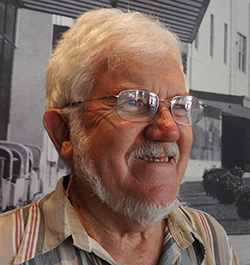 Geoff Page has published twenty-two collections of poetry, as well as two novels and five verse novels. His recent books include 1953 (UQP 2013) (on the Prime Minister’s Literary Awards shortlist for 2014), Improving the News (Pitt Street Poetry, 2013), New Selected Poems (Puncher & Wattmann, 2013), and Gods and Uncles (Pitt Street Poetry, 2015). Aficionado: A Jazz Memoir was published in 2014 by Picaro Press. He also edited The Best Australian Poems 2014 and The Best Australian Poems 2015 (Black Inc.).
Geoff Page has published twenty-two collections of poetry, as well as two novels and five verse novels. His recent books include 1953 (UQP 2013) (on the Prime Minister’s Literary Awards shortlist for 2014), Improving the News (Pitt Street Poetry, 2013), New Selected Poems (Puncher & Wattmann, 2013), and Gods and Uncles (Pitt Street Poetry, 2015). Aficionado: A Jazz Memoir was published in 2014 by Picaro Press. He also edited The Best Australian Poems 2014 and The Best Australian Poems 2015 (Black Inc.).
States of Poetry
'Flags'
Recording
Geoff Page reads 'No name or rank supplied', 'Flags', and 'The Notebooks'
Further reading and links
Geoff Page's website
Australian Poetry Library - Geoff Page
 Isi Unikowski’s poetry has been widely published in Australia and overseas. He was shortlisted for the inaugural University of Canberra Vice Chancellor’s International Poetry Prize. He is currently a PhD candidate at the Crawford School of Public Policy, Australian National University.
Isi Unikowski’s poetry has been widely published in Australia and overseas. He was shortlisted for the inaugural University of Canberra Vice Chancellor’s International Poetry Prize. He is currently a PhD candidate at the Crawford School of Public Policy, Australian National University.
State Editor Jen Webb's notes
Isi Unikowski came to my attention when he was shortlisted for the 2014 University of Canberra Vice-Chancellor’s International Poetry Prize. His selected poem was dense with imagery and, like his subsequent poems, blends the intellectual and the visceral. His work runs the gamut from modernist-style precision to what is almost comedic in its insider-outsider view of the field.
Poems
‘You Never Said It’s A Race, Dad!’
Recording
Isi Unikowski reads 'Grammar Lesson', 'You Never Said It's A Race, Dad!', and 'Still Life'
Further reading and links
Staff Profile: Isi Unikowksi, Australian National University, Crawford School of Public Policy
Cordite Poetry Review: Isi Unikowski
 John Foulcher has published ten books of poetry. The first was Light Pressure (Angus & Robertson, 1983); the most recent, a selection of the previous nine volumes, was 101 Poems (Pitt Street Poetry, 2015). His work has been published in magazines, newspapers, and anthologies for the past thirty-five years. In 2010 he was the Literature Board’s resident at the Keesing Studio in Paris; his book, The Sunset Assumption (Pitt Street Poetry, 2012), was a reflection on that experience. He is at present completing his next book, titled A Casual Penance. He has also been also a secondary school teacher in New South Wales, Victoria, and the ACT.
John Foulcher has published ten books of poetry. The first was Light Pressure (Angus & Robertson, 1983); the most recent, a selection of the previous nine volumes, was 101 Poems (Pitt Street Poetry, 2015). His work has been published in magazines, newspapers, and anthologies for the past thirty-five years. In 2010 he was the Literature Board’s resident at the Keesing Studio in Paris; his book, The Sunset Assumption (Pitt Street Poetry, 2012), was a reflection on that experience. He is at present completing his next book, titled A Casual Penance. He has also been also a secondary school teacher in New South Wales, Victoria, and the ACT.
State Editor Jen Webb's notes
John Foulcher is a long-term resident of the ACT, and a very active member of the poetry community. He shifts confidently between prose poems and lineated poems, mixing narrative, imagery and memory in what are often sharply moving works. I recorded his reading at his home in Canberra, and you will be able to detect, behind his voice, the hum and burr of this small city.
Poems
Recording
John Foulcher reads 'The Poetry Exam', 'Paris Evening', and 'Before the Storm'
Further reading and links
Wikipedia – John Foulcher
‘2016 Books of the Year’, Australian Book Review, December 2016, issue no. 387
‘Peter Kenneally reviews 101 Poems by John Foulcher, Small Town Soundtrack by Brendan Ryan, and Ahead of Us by Dennis Haskell’, Australian Book Review, June-July 2016, issue no. 382
Pitt Street Poetry – John Foulcher
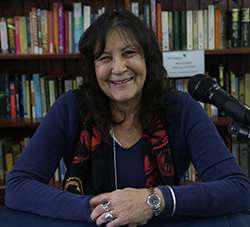
A Wiradjuri woman from Central New South Wales, Kerry Reed-Gilbert has performed and conducted writing workshops nationally and internationally. She was the inaugural Chairperson of the First Nations Australians Writers Network (FNAWN). In 2013 she co-edited a collection of works with the US Mob Writing (UMW) group ‘By Close of Business’, and was co-editor for the Ora Nui journal, a collaborative collection between First Nations Australia writers and Maori writers.
Kerry is a former member of the Aboriginal Studies Press Advisory Committee. Her poetry and prose have been published in many journals and anthologies nationally and internationally, including the Macquarie PEN Anthology of Australian Literature and Southerly. She is a member of the ACT Us Mob Writing group and First Nations Australia Writers’ Network.
She has edited, published and been published in numerous books and publications, including Talkin’ About Country: Poetry Collection (Kuracca); The Strength of Us as Women: Black Women Speak (ed.; Ginninderra Press); Our Place: Stories about Good Practice in Youth Work with Young Aboriginal People (ed. with Shane Brown; South Sydney Youth Services); Message Stick: Contemporary Aboriginal Writing (ed.; IAD Press); Ngunnunggula (Belonging to Here): Stories and Poems (ed.; FreeXpression); and Black Woman Black Life (Wakefield Press).
In 2006 she received an ‘Outstanding Achievement in Poetry’ award and ‘Poet of Merit’ Award from the International Society of Poets. In 2005 she toured Aotearoa New Zealand as part of the Honouring Words 3rd International Indigenous Authors Celebration Tour. In 2003 she was awarded an International Residence from ATSIAB to attend Art Omi, New York, USA; and in 1997 she toured South Africa performing in ‘ECHOES’ a national tour of the spoken word.
Her work has been translated in French, Korean, Bengali, Dutch, and other languages.
State Editor Jen Webb's notes
Kerry Reed-Gilbert is a Wiradjuri woman who is a leading figure in Canberra poetry, particularly in the contributions she makes to raising the profile of contemporary Indigenous and Torres Strait Islander poets. Like her famous father, Kevin Gilbert, she writes poems that present what can be a scathing critique of the politics of contemporary culture. But as well as the activist eye, Kerry explores her passion for land, culture, family and humanity.
Poems
‘Got ya’
Recording
Kerry Reed-Gilbert reads 'Wiradjuri Country', 'Got ya', and 'Just leave your mark here'
Further reading and links
AustLit – Kerry Reed-Gilbert
‘Working with Words: Kerry Reed-Gilbert’, The Wheeler Centre, 19 October 2015
Cordite Poetry Review – Kerry Reed-Gilbert
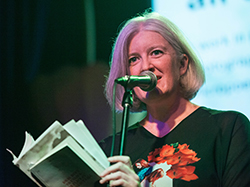 Melinda Smith won the 2014 Prime Minister's Literary Award for her fourth poetry collection, Drag down to unlock or place an emergency call (2013). Her poems have appeared in publications such as Antipodes, Axon, Cordite, foam:e, Island, Quadrant, and Verity La. Her work has been widely anthologised, including in the United States, the United Kingdom, and New Zealand, has been translated into Italian, Chinese, and Burmese, and has appeared multiple times in The Best Australian Poems series and on ABC Radio National’s PoeticA. She frequently collaborates with visual artists, and her poetry has appeared in gallery and museum spaces, in artists’ books, and as ceiling projections, among other things.
Melinda Smith won the 2014 Prime Minister's Literary Award for her fourth poetry collection, Drag down to unlock or place an emergency call (2013). Her poems have appeared in publications such as Antipodes, Axon, Cordite, foam:e, Island, Quadrant, and Verity La. Her work has been widely anthologised, including in the United States, the United Kingdom, and New Zealand, has been translated into Italian, Chinese, and Burmese, and has appeared multiple times in The Best Australian Poems series and on ABC Radio National’s PoeticA. She frequently collaborates with visual artists, and her poetry has appeared in gallery and museum spaces, in artists’ books, and as ceiling projections, among other things.Melinda Smith will be a featured writer at the 2016 Rose Scott Women Writers’ Festival, and will be one of this year’s four international guest poets at the annual Voci Lontane Voci Sorelle poetry festival in Florence. She has just returned from a Bundanon Trust residency where she completed the manuscript for her fifth collection (working title Goodbye Cruel, Pitt Street Poetry). She has lived in the ACT on and off for over twenty-five years, and is currently poetry editor of The Canberra Times.
State Editor Jen Webb's notes
Melinda Smith is a long-term Canberra poet who came to national prominence when she won the 2014 Prime Minister's Literary Award. Since that point she has been even more visible in the creative community, and is a catalyst for poetry in the region. Not only is she very involved in writing and presenting her own poetry, but she also enriches the creative ecology of our region, collaborating with visual artists, and shaping the field in her role as the poetry editor of The Canberra Times.
Poems
‘What you get when you search for silence’
‘Hammam’
Recording
Melinda Smith reads 'some trees' and 'The Undiscovered Country'
Further reading and links
Melinda Smith’s website
Wikipedia – Melinda Smith
‘Canberra Close Up: Melinda Smith’, 666 ABC Canberra, 15 September 2016
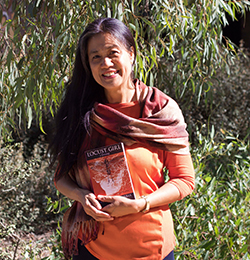 Merlinda Bobis’s most recent poetry book is the trilingual collection (Bikol, Filipino, English) Pag-uli, Pag-uwi, Homecoming (2004). Her previous book of poetry, Summer Was a Fast Train Without Terminals (1998), was shortlisted for The Age Poetry Book of the Year Award. Her short stories White Turtle (1999) received the Steele Rudd Award for the Best Published Collection of Australian Short Stories and the Philippine National Book Award. She went on to create poetic dramatic works, which were performed in Australia, Philippines, France, Spain, the United States, Canada, and Singapore. Among them was River, River, her one-woman play adaptation of her novel written in poetic prose, Fish-Hair Woman (2012), which also received a Philippine National Book Award. Her fourth poetic prose novel, Locust Girl. A Lovesong (2015), won the 2016 Christina Stead Prize for Fiction. Merlinda Bobis recently completed a poetry manuscript, ‘Accidents of Composition’, her sixth book of poems.
Merlinda Bobis’s most recent poetry book is the trilingual collection (Bikol, Filipino, English) Pag-uli, Pag-uwi, Homecoming (2004). Her previous book of poetry, Summer Was a Fast Train Without Terminals (1998), was shortlisted for The Age Poetry Book of the Year Award. Her short stories White Turtle (1999) received the Steele Rudd Award for the Best Published Collection of Australian Short Stories and the Philippine National Book Award. She went on to create poetic dramatic works, which were performed in Australia, Philippines, France, Spain, the United States, Canada, and Singapore. Among them was River, River, her one-woman play adaptation of her novel written in poetic prose, Fish-Hair Woman (2012), which also received a Philippine National Book Award. Her fourth poetic prose novel, Locust Girl. A Lovesong (2015), won the 2016 Christina Stead Prize for Fiction. Merlinda Bobis recently completed a poetry manuscript, ‘Accidents of Composition’, her sixth book of poems.
State Editor Jen Webb's notes
Merlinda Bobis has been part of the ACT literary community, and resident here off and on, since the early 2000s. Merlinda writes in Bikol and Filipino as well as English, and weaves phrasing and imagery from her first home, the Philippines, through her contemporary verse. She has a substantial practice as a performer, something evident in her poetry reading presented on this site.
Poems
Recording
Merlinda Bobis reads 'Lucy afloat' and 'After Reming'
Further reading and links
Merlinda Bobis’s website
‘Locust Girl by Merlinda Bobis wins Christina Stead prize for fiction’, The Sydney morning Herald, 17 May 2016
The ACT – home to fewer than half a million people, and housing less than two per cent of the national population – is a very small community, but one that is interesting, energetic, and creative. It is not particularly representative of Australia; the people are, on average, a bit younger, more likely to be employed, earning a higher annual income, and significantly more likely to hold higher degrees than other Australians. And it is, of course, the federal capital, which means that its life beyond the Parliamentary Triangle is often overlooked by commentators on this community. Despite this, it offers a fertile ground for the writing and reading of poetry.
In preparation for the second issue of the ABR’s States of Poetry mini-anthology project, I cast about to find a range of poets working across the range of modes, forms, and voices found in the ACT. This meant attending a variety of poetry events and listening to and reading local poets. My task was made easier by the fact that my workplace, the University of Canberra, hosted the second of a three-year cycle of festivals, ‘Poetry on the Move’. Over 1,500 Canberrans and other poets participated as readers, performers, audience members, and panellists, in workshops, talkfests, and other events. This, along with the other regular poetry events held in the city and its environs, allowed me to listen closely to the voices of poetry, and to reflect on the state of poetry in 2016 Canberra.
The six poets selected for this year’s mini-anthology are at different stages of their literary careers, each with a different focus, aesthetic, and sense of audience. Several of them are influential public figures, making poetry happen and making it visible. All six are energetic contributors to the local literary ecology; and, public or more private, long established or emerging, all offer something rich and evocative in their practice and in their bodies of work.
Merlinda Bobis has been part of the ACT literary community, and resident here off and on, since the early 2000s. Merlinda, who writes in Bikol and Filipino as well as English, weaves phrasing and imagery from her first home, the Philippines, through her contemporary verse. She has a substantial practice as a performer, something evident in her poetry reading presented on this site.
John Foulcher is a long-term resident of the ACT, and an active member of the poetry community. He shifts confidently between prose poems and lineated poems, mixing narrative, imagery, and memory in what are often sharply moving works. I recorded his reading at his home in Canberra, and you will be able to detect, behind his voice, the hum and burr of this small city.
Geoff Page is the godfather of ACT poetry: not only has he published twenty-two volumes of his own poetry, but he has also been editor for a number of important local and national volumes, and has an extensive profile as an informed and thoughtful reviewer of new Australian poetry in and beyond the ACT. Geoff is also the motive force for the monthly poetry readings that have been held in Canberra for over a decade now, which profile visiting national and international poets, as well as local practitioners.
Kerry Reed-Gilbert is a Wiradjuri woman who is a leading figure in Canberra poetry, particularly in the contributions she makes to raising the profile of contemporary Indigenous and Torres Strait Islander poets. Like her famous father, Kevin Gilbert, she writes poems that present what can be a scathing critique of the politics of contemporary culture. But as well as the activist eye, Kerry explores her passion for land, culture, family, and humanity.
Melinda Smith is a long-term Canberra poet who came to national prominence when she won the 2014 Prime Minister's Literary Award. Since that point she has been even more visible in the creative community, and is a catalyst for poetry in the region. Not only is she very involved in writing and presenting her own poetry, but she also enriches the creative ecology of our region, collaborating with visual artists, and shaping the field in her role as the poetry editor of the Canberra Times.
Isi Unikowski came to my attention when he was shortlisted for the 2014 University of Canberra Vice-Chancellor’s International Poetry Prize. His selected poem was dense with imagery; like his subsequent poems, it blends the intellectual and the visceral. His work runs the gamut from modernist-style precision to what is almost comedic in its insider–outsider view of the field.
All six poets impress me with their focused approach to their practice and – equally important (to me) – to the poetry community. In a city state like Canberra/the ACT, it is less easy than in major population centres to remain invisible, or to attend only to one’s own concerns. Each of these poets has a body of work that is vibrant, well crafted, sometimes very funny, often deeply moving, and always worth reading. I commend them to you.

